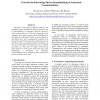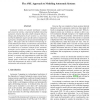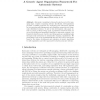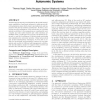POLICY
2005
Springer
14 years 5 months ago
2005
Springer
Autonomic systems are needed to self-manage the increasing complexity of pervasive communications access and the ubiquitous computing services it offers to humans. Policy based go...
WOWMOM
2006
ACM
14 years 6 months ago
2006
ACM
Distributed software environments are increasingly difficult to manage. This paper presents a middleware for the development of self-manageable and autonomic systems. Preliminary ...
WOWMOM
2006
ACM
14 years 6 months ago
2006
ACM
Currently a wide range of different adaptive and intelligent system solutions are being proposed for use in self-managing or autonomic networks. However, there are few means by wh...
ICAS
2006
IEEE
14 years 6 months ago
2006
IEEE
The trend towards autonomic systems emphasizes the need for implementation frameworks for autonomic features. In this paper we describe a general framework for the development of ...
ICAS
2006
IEEE
14 years 6 months ago
2006
IEEE
Autonomic systems are typically distributed, complex and concurrent systems, comprised of multiple interacting autonomic elements that often exhibit emergent behavior. Design and ...
AUTONOMICS
2009
ACM
14 years 6 months ago
2009
ACM
Abstract. Autonomic computing is being advocated as a tool for managing large, complex computing systems. Specifically, self-organisation provides a suitable approach for developi...
ICAC
2009
IEEE
14 years 7 months ago
2009
IEEE
The design of autonomic systems often relies on representative benchmarks for evaluating system performance and scalability. Despite the fact that experimental observations have e...
ICAC
2009
IEEE
14 years 7 months ago
2009
IEEE
Architectural monitoring and adaptation allows self-management capabilities of autonomic systems to realize more powerful adaptation steps, which observe and adjust not only param...
SIGMOD
2005
ACM
15 years 13 days ago
2005
ACM
We are witnessing an explosive increase in the complexity of the information systems we rely upon. Autonomic systems address this challenge by continuously configuring and tuning ...




